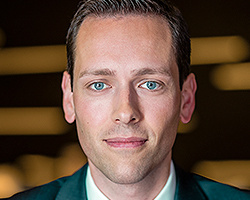Prejudice
"As someone with an auditory impairment, I notice there is a lot of prejudice about deaf people. People feel awkward and don't know how to communicate with us. But deaf people come in all shapes and sizes. I myself am completely deaf, but I learnt to talk well before my deafness started to develop between the ages of five and seven. But regardless who you want to talk to, we are almost all experts at making sure communication runs smoothly. So you don't have to be afraid of that at all when speaking with a hearing-impaired person. Unfortunately, those prejudices do make it sometimes difficult to find a job.
No progress
I have worked in an administrative position for a long time now, but for 11 years I did not get beyond opening mail. My previous employer found it annoying that explaining things to me took more time. After all, I cannot look at a computer screen and listen to an explanation at the same time. My personal qualities went unnoticed and I did not progress as a result. Back then, I applied for a lot of jobs, but as soon as I put in my letter that I was deaf, I was turned down for interviews. But if I didn't put it in and was invited, they would think: 'What else is she hiding?'
Focus on qualities
I had actually given up on ever finding a nice job. But then I was given the opportunity to work in a customer service department, in a team with other people with occupational disabilities, including deaf people. There I was able to develop considerably, but the job didn’t offer me enough challenges after a while. So when I was approached six months ago by a former team leader for a position at DNB's HR Service Desk, it was the perfect opportunity for me. They deliberately sought to hire an employee with an auditory impairment, and during the job interview I immediately noticed that they looked at my qualities rather than my limitations.
At DNB, I get all the support and opportunities I need; my job offers me so many great challenges.
What can I do?
At DNB, I get all the support and opportunities I need. I have only just started working here, but this job offers me so many great challenges. People think in terms of possibilities, and they are patient. Of course, I cannot answer the phone, but that's why I focus on other tasks. In our team, we all have our own expertise.
To participate as fully as possible, I am assigned a sign language interpreter for 15% of my working hours, who is paid for by the UWV social security agency. The interpreter helps out during our daily work meetings, and during training and knowledge sessions. My colleagues are cool with the fact that an interpreter is present. Unfortunately, those hours aren't enough to cover everything I would like, so we're still working on finding other solutions. Fortunately, my manager is very supportive.
Connection and development
DNB also organises regular activities and meetings especially for employees with occupational disabilities. I appreciate that very much. Although I feel equal to everyone else, it’s great to be with others who are facing similar challenges. Similarly, an empowerment training session will soon be organised, in which we will learn to develop various skills, such as personal leadership.
When you employ someone with an occupational disability, that obviously reflects favourably on you as an organisation. But you also need to actively invest in these people. After all, we want to develop further too. And that’s where DNB really offers the opportunities you need. People are always willing to do what they can, even if not everything can be done. I really like how everyone here does their very best to understand and support me. There is a very warm and friendly atmosphere in the organisation that feels like family."


